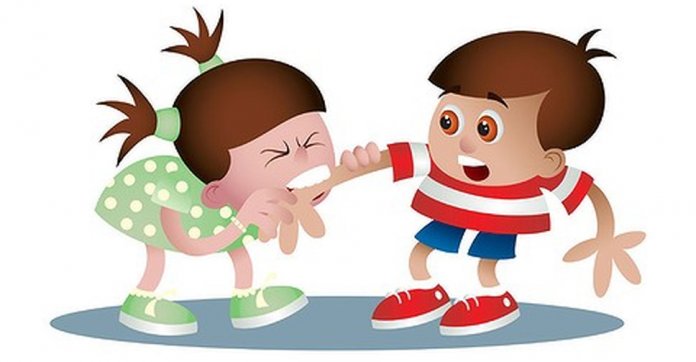Despite biting seems to be a sign of aggression or bad behaviour, it’s only normal and many toddlers go through that phase in an attempt to release tension, frustration or anger.
Imagine this…
You had a terrible day and everything has gone wrong. You are feeling tired, frustrated, irritated and running late for an important meeting.
Someone on the street bumps into you and drops your stuff on the floor. That person acts as if nothing has happened and says it was your fault!
Okay. You are not going to bite this person, but you probably would react in an “instinctive way” if you were not mature enough and didn’t know how to deal with the feelings of stress and anger.
So that’s almost what happens to babies and toddlers – they don’t know how to manage their feelings yet and biting is a form of releasing those emotions, especially when they are unable to use language skills to communicate.
As children are still developing self-control they simply act. It’s almost as if there’s a big wave of tension that they can’t control and don’t know how to stop.
Remember that children may not always express their frustration or anger through “expected behaviours” such as crying or throwing a tantrum when a moment of stress rise.
Biting is an impulse, and when children act out these kinds of feelings in a way that is an aggressive impulse, it is on some level, discomfort.
What is the trigger?
Toddlers need chances to express their frustrations, discomforts, and other upsets on a daily basis. They need to feel understood and safe all the time.
Sometimes mum and dad are busy as they have to work, do the groceries, clean the house, take care of siblings. When in childcare the caregivers also need to give attention to other kids.
All these little things build tension and discomfort, especially if the child is in a phase in which she or he needs extra understanding and support.
An ordinary day can easily leave a toddler feeling sad or irritated, even when “nothing” has happened from an adult’s point of view.
If a toddler is dealing with a change in his routine, perhaps a sibling that just born or because dad was away for work a few days, this child is likely to seek comfort, someone who will understand his sadness and fears, and will let him be upset for as long as he needs.
The well-intended caregiver believes that making him stop crying by giving a bottle or putting him to sleep will release the tension, so the child stuffed away his feelings and couldn’t find any way to express them.
The next day the child bites another child.
He tried to release his tensions but it didn’t work, so those feelings jumped out in the form of biting as he was full of tension to function well.
A child expressing feelings by biting others doesn’t mean that there’s anything wrong with the way parents are educating. It’s not the parents or the toddler’s fault and has absolutely nothing to do with being “bad”.
Biting is common, it is a typical childhood behaviour and commonly seen in groups of children aged between one and three years old. These are the children who are exploring the world but don’t always have the benefit of speech to communicate what they want.
The good news is that biting is usually a temporary issue. It improves as children get older and learn self-control and better communication skills.
How should I respond to biting incidents?
When your child bites someone, the first thing to do is to try and control your own impulses first. That child doesn’t need someone yelling or showing disappointment and frustration (even though you may be feeling that way).
Talk gently to him. You can say that you are sorry you didn’t get there in time to make things safe. Ask if he can tell you how he’s feeling and offer support!
You won’t get much explanation but you will get a child who feels that you are there trying your best to connect with his feelings.
Blaming or punishing a child who bites will only cause more emotional problems.
If the child is in need of understanding but can’t tell you that because of the lack of communication skills, how can punishment be a good solution?
The child will move away from biting as soon as the release of his scary feelings allow him to relax again.
Children who bite are good children, they are simply in need of a good cry in the arms of a loving adult – any adult – parents, caregivers, grandparents or friends.
There’s no need to feel ashamed if your toddler bites. Biting is, for many children, a normal part of exploring their environment and a response to some feelings that they can’t control and can’t express in words. This doesn’t make the behaviour okay, however understanding why children bite can help parents to navigate this phase of childhood with greater confidence and less stress.


 My name is Natalia, sweetly called "Lala" since I started working with children. I am the owner of Lala’s Family Day Care and my passion is to make positive connections with my little ones, providing high-quality learning experiences. I believe that every child is unique and they grow the best when they feel valued, loved, happy and secure.
My name is Natalia, sweetly called "Lala" since I started working with children. I am the owner of Lala’s Family Day Care and my passion is to make positive connections with my little ones, providing high-quality learning experiences. I believe that every child is unique and they grow the best when they feel valued, loved, happy and secure.